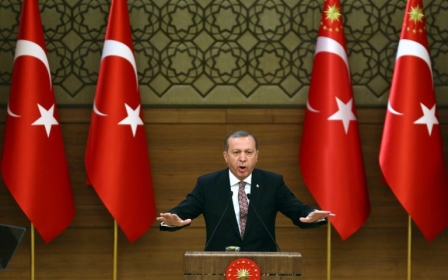Turkish politics in freefall as PM Davutoglu considers resignation

Turkey's ruling AKP party has announced an extraordinary congress for May 22, amid reports Ahmet Davutoglu was to step down as prime minister.
The announcement of a congress on Thursday was made after talks between Davutoglu and President Recep Tayyip Erdogan.
Turkish media CNN-Turk and NTV television reported that the congress would elect a new chairman, who according to party convention would also serve as prime minister.
Davutoglu will seek a new mandate in either role, according to reports.
An official from the PM's office, contacted by AFP, declined to comment on the reports, saying Davutoglu would soon make a statement.
After 14 years in power, the ruling Justice and Development Party (AKP) may be coming apart at the seams. But far more threatening than the unravelling of a political party are fears about the direction in which the country is headed.
Both domestic and international critics have for years pointed to the growing authoritarianism and strong-man tactics employed by Erdogan. The fact that he can so easily dismiss the prime minister, a man he rapidly promoted through the ranks, is sending shivers down the spines of many.
“This is a palace coup,” said Yusuf Kanli, a veteran commentator on Turkish politics. “The president wanted the prime minister to step down and that’s it. Now we will have a party convention in May or early June,” Kanli told Middle East Eye.
Rumours of tensions within the party have been rife for almost a year, but not even the AKP’s worst enemies had imagined a split could occur on such a scale. Unconfirmed reports suggest the AKP will convene a party congress within 60 days and that Davutoglu will not stand as a candidate.
“Events today show that the AKP will move to consolidate Erdogan’s aspirations of becoming a super president. Whether they will succeed remains to be seen. These are very fine political calculations,” Kanli said.
The party congress elects the party chairman, who automatically becomes their choice for prime minister.
The office of the presidency has not commented on the Ergogan-Davutoglu meeting, other than announcing it was a regular scheduled event.
The prime minister usually has a weekly meeting with the president on Thursdays, but this one was brought forward by a day as speculation about the tensions mounted.
Abdulkadir Selvi, a Turkish journalist known for his close links to the Davutoglu camp, also said that the prime minister does not intend to stand in the forthcoming congress.
Speaking to local broadcaster CNN Turk, Selvi said: “We will only know for certain whether the prime minister won’t stand to be party chairman again tomorrow. But it is clear that a decision was reached that the differences of opinion [between the prime minister and president] cannot be resolved without announcing a party congress.”
Erdogan has made statements in recent times that appeared to directly target Davutoglu.
He said the importance of a deal granting Turkish citizens visa-free travel in the EU Shengen zone had been exaggerated. Davutoglu championed the deal as a major victory for his party and team.
Another signal that Davutoglu was out of favour was when he was stripped of his power to appoint provincial party leaders on 29 April. That authority was handed back to the party’s central decision-making board.
Earlier on Wednesday, Erdogan made a cryptic statement saying that “people should not forget how they attained their position”. It was widely interpreted as a dig at Davutoglu, who rose rapidly through the ranks of the AKP from adviser to foreign minister to prime minister.
Observers say Davutoglu did not turn out to be the simple “yes man” that Erdogan expected him to be amid planned constitutional changes that would increase the power of Erdogan's presidency.
As Turkey enters another period of high political tensions, Kanli said it may lead to a splinter party with centre-right tendencies that could challenge the AKP.
“All this happens because of the absence of a credible opposition. The left has proved useless,” Kanli said. “But we could have a real centre-right alternative to the AKP if Davutoglu were also to join the already disgruntled camp of the likes of former president Abdullah Gul and former deputy prime minister Bulent Arinc.”
Davutoglu had also come under fire from what many believe are pro-Erdogan journalists, one of whom, Nasuhi Gungor, even said on live TV that the time had come to move on without Davutoglu.
The Twitter handle Baskentci, believed to be operated by someone high in the Davutoglu camp, released a series of tweets after the meeting suggesting that Davutoglu was being sidelined but that he would not resign.
Some of the tweets were:
- “Congress will be held before Ramazan.”
- “Hoca (Professor) won’t resign.”
- “Hoca will not stand (for chairman) in congress either.”
- “MPs are surprised.”
- “There will be changes in the cabinet.”
- “Congress to be held with one candidate on 29 May.”
Davutoglu has developed a reputation as a soft-spoken but firm-principled politician whose academic background enabled him to develop a wider vision, particularly regarding Turkey’s foreign policy.
Stay informed with MEE's newsletters
Sign up to get the latest alerts, insights and analysis, starting with Turkey Unpacked
Middle East Eye delivers independent and unrivalled coverage and analysis of the Middle East, North Africa and beyond. To learn more about republishing this content and the associated fees, please fill out this form. More about MEE can be found here.




